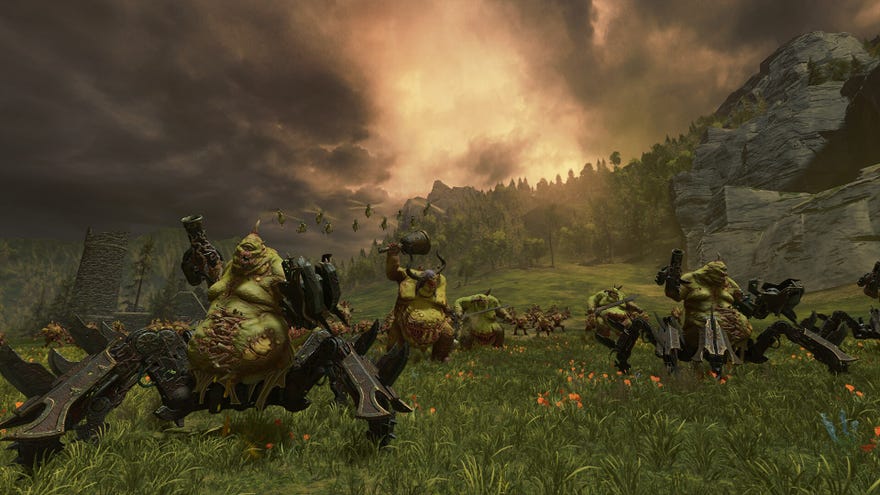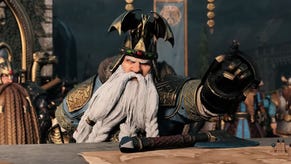Total War Warhammer 3 Nurgle Faction Guide: How to win with Nurgle in campaign and on the battlefield
Spread glorious rot in Grandfather’s name with our Nurgle guide
Looking for a Total War: Warhammer 3 Nurgle Guide? One of the four brand new chaos monogod factions in Total War: Warhammer III, Nurgle is a deceptively strong faction, once you learn to compensate for their glaring weaknesses on the battlefield and campaign. Read on to find out the nuances of each unit, hero, and spell, as well as a tactical overview of how the forces of Nurgle compliment each other on the battlefield.
On this page:
Nurgle roster guide
You’d be absolutely forgiven for feeling that playing a faction of spluttering, bile-flecked demons that delight in spreading devastating pandemics hits a little too close for comfort. But Nurgle can still be a hugely rewarding and interesting battlefield experience, once you iron out a few kinks. You can find out where Nurgle ranks on our faction tier list. For now, Let’s break the roster down.
Ku’gath Plaguefather
Nurgle’s sole legendary lord, this biggest of Chungi is effectively a moving artillery piece with some devastating buffs and debuffs close up. Use his nurgling launcher to bait your foe into moving up on your army, negating Nurgle’s slow speed. Keep him close to Nurglings in combat for a passive regeneration aura, and spec him into his ‘Pestilent Decay’ skill to cause constant damage to anything around him. Even with a huge health pool, he’s still a big target for enemy missiles, so keep an eye on his HP and make sure you’re using your mobile contingent to tie up potential threats.
Exalted Great Unclean One (Death/Nurgle)
Once your Heralds hit rank fifteen, you’ll be given the option to turn them into an Exalted Great Unclean one, at the cost of half their levels. This is always worth doing, unless you’ve carefully specced out a Herald for a specific purpose. Essentially more melee-focused Ku’Gaths without the artillery weapon, these stinky boys are huge damage sponges, with a range of effective debuffs for swinging melee grinds. We’ll cover their magic lores below.
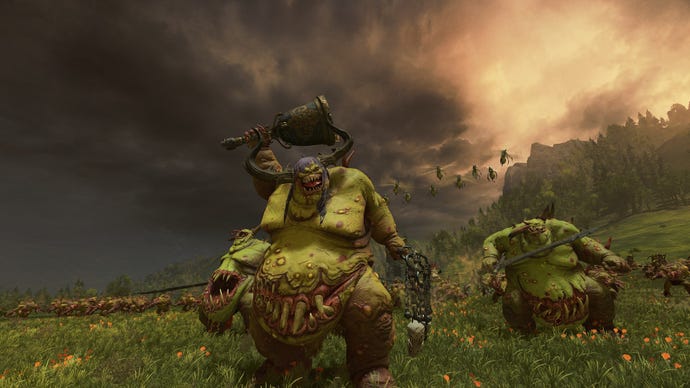
Herald (Death/Nurgle)
Your basic Nurgle lord, Heralds aren’t incredible in melee, but do have access to the usual Nurgle survivability. They’re functionally very similar, though slightly better, than the Plagueridden heroes. Swap them out with Exalted Great Unclean One whenever possible.
Plagueridden (Death/Nurgle)
Hybrid melee/spellcasters with that trademark Nurgle tankiness. You can mount them on a Palanquin for more health, but you’ll find much more utility in their Rotfly mounts. As is true for the rest of the roster, take any opportunity to add more mobility to your army.
Cultist of Nurgle
The cultist can gain access to a horse mount early, which you should absolutely take for its speed. At higher levels, they can summon a unit of plaguebearers three times a battle, and a great unclean one once. Send them up the flanks then bounce them around between enemy archers, disrupting their lines and summoning in units, to cause real problems.
Nurglings
Nurgle’s basic meat shield/chaff unit, Nurglings can still soak up a lot of damage. Keep them close to Ku’Gath for that regeneration aura, spec into a few early game upgrade techs, and these adorable little pus goblins become very hard to kill. Use them to take charges or tar pit elite infantry.
Plaguebearers (Standard/Exalted)
Nurgle’s standard frontline troop, these melee infantry are lacking in speed but durable enough to make up for it. Vulnerable, like much of the roster, to sustained missile fire, and not the best damage dealers, but able to hold the line like little else. The Exalted are the upgraded version, and come with a ranged attack. I’ve found this very useful for focus-firing down large single entities, like enemy monsters, once tarpitted in combat with your other troops. This is something Nurgle can struggle with in general, so a nice option to have.
Forsaken of Nurgle
Faster, stronger, and with better armour than Plaguebearers, but with less health and a lower model count, Forsaken are best used to support your frontline. Use that increased speed to get some early charges into the flanks of whatever the Plaguebearers or Nurglings engage head on.
Beasts of Nurgle
These slimy funsters are single entities with a nice bump in speed compared to your frontline, armour piercing, and regeneration. Like all units with regen, they take extra damage from fire attacks, like that of Ogre Firebellies or Exalted Bloodletters of Khorne, so be a bit careful with your engagements. Otherwise, they’re great for supporting your frontline against elite infantry, or harassing archers in a pinch.
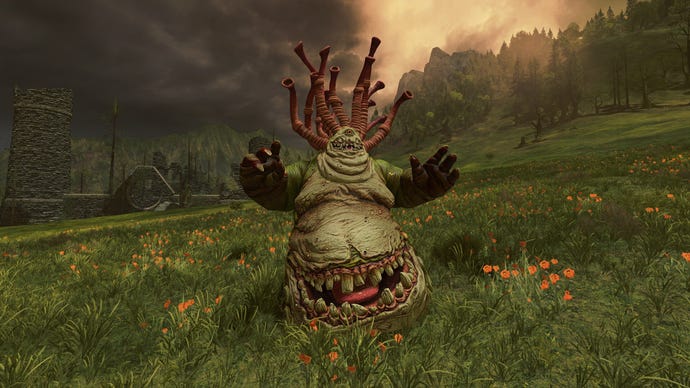
Spawn of Nurgle
The tanks have a huge health pool, which makes them particularly useful with Nurgle’s healing abilities. They’re also unbreakable, making them ideal for tying down key units while others get into place.
Plague Toads/Pox Riders
With riders or without, these gigantic toads are Nurgle’s monstrous cavalry option. With 60 speed, they’re still slower than your typical heavy cav, but play much the same role. Use them to flank and mulch enemy infantry or light cavalry, but watch out for anti-large cavalry or halberds. The Pox Riders are effectively the same unit, but better.
Rot Flies/Plague Drones
Nurgle’s flying cavalry, and very fast, perfect for disrupting enemy archer lines. The Plague Drones come in two variants. One has a ranged weapon, great for wearing down those big single entity monsters, and the other is a more dangerous version of the basic Rot Fly. All are armour piercing, though a bit squishy due to a low model count. They’re great for cycle-charging elite infantry from the rear while your frontline keeps them busy.
Nurgle Furies
Your budget flyer option, used for shutting down low tier ranged units or artillery while your main army approaches. They’re cheap to field, but worth replacing when you have access to Rot Flies, funds allowing.
Great Unclean One
The Great Unclean one is a baby version of their Exalted lord variant, although I use the term baby loosely, as these are still some seriously hefty boys. Vulnerable to missile fire, but able to mulch through infantry and even duel enemy characters due to their enormous HP pools. You can also give them access to Nurgle spells through technology, although your Winds of Magic is usually better spent by your dedicated casters.
Soul Grinder
With its huge speed, melee prowess, armour, and artillery weapon, the Soul Grinder is a key piece in the Nurgle roster, and no army should be without two or more to shore up its weaknesses. Use that long ranged bombardment to make the enemy move up on you. Once you’ve spent the ammo, put that huge mass to work and tear straight through the frontlines into those squishy ranged units.
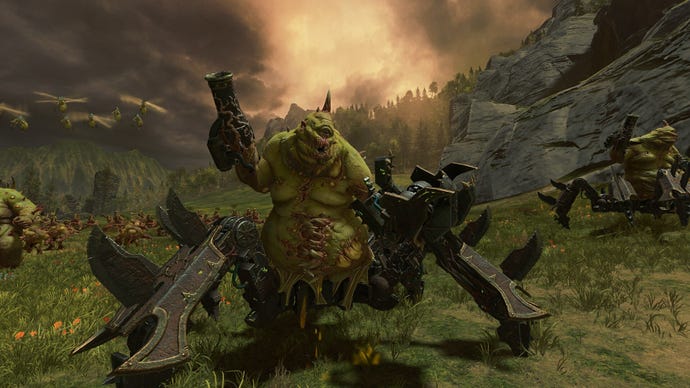
Nurgle magic spells list
Below, we’ll look at Nurgle’s unique lore of magic, the Lore of Nurgle.
Nurgle spells:
- Miasma of Pestilence: At 8 winds of magic for an AOE overcast, and offering a chunky 24 melee attack and 40% ranged bonus debuff, this low level spell can still be extremely clutch used in conjunction with all the other debuffs in the Nurgle roster. All Nurgle units have increased melee defence anyway, due to their ‘cloud of flies’ skill, and poison attacks, offering further melee penalties. Combine this with their naturally large health pools, and suddenly your foe’s elite infantry are swinging twigs around.
- Stream of Corruption: A tear shaped breath attack with low damage and poison. Since so much of your roster has poison attacks anyway, your Winds are better spent elsewhere.
- Curse of the Leper: Granting a big armour buff and damage reflection, this can be very useful if you mis-micro a unit and get them in a bad situation. Lay this down to even the odds while you’re working on getting some support into place.
- Rancid Visitations: A direct damage spell that drains the health of an enemy character, similar (though less effective) than the Lore of Death’s spirit leech. It can be useful, but it's so expensive you’ll want to consider other options first.
- Blight Boil: A huge, devastatingly powerful AOE explosion that takes a while to build up, but can decimate multiple units once it does. Charge a soul grinder into a mass of infantry, wait for them to blob up around it, then bring the pain.
- Fleshy Abundance: A hugely effective healing spell that can be overcast to heal entire sections of your army for massive damage. Nurgle are hard enough to kill anyway, so save this for midway through a fight to make your foe weep in despair.
Nurgle battle tactics
We’ve looked at each unit in the Nurgle roster, and the unique lore of magic at their disposal. So, how do you combine it all to make them a formidable force on the battlefield? Here are some general tips to get the most out of Nurgle.
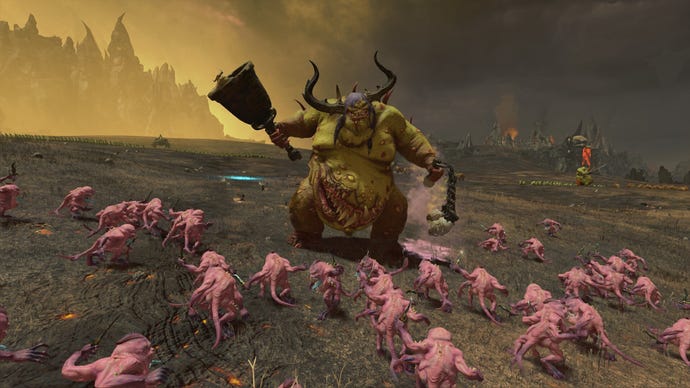
Neutralise enemy missiles
Despite their high melee defence, Nurgle are as vulnerable to sustained missile fire as any other faction, and the glacial pace of most of the army often means weathering all the opposing force can throw at you on the way in. Spells like Fleshy Abundance, alongside the army heal, will help mitigate this, but it’s still best to find alternative ways of dealing with it. Artillery like Soul Grinders and Ku’gath can attempt to force the enemy to move up on you. Rotflies, furies, toads and cultists can disrupt missile lines, and a well placed Blight Boil - preferably from a Plagueridden on a rotfly, can blow a hole in a backline.
Bait those blobs
While this is good advice for any army with access to AOE spells, like Grand Cathay or Kislev, forcing blobs is especially effective for Nurgle. Many of their specialised units, army abilities, spells, or active abilities rely on debuffing or harming units within their sphere of influence. Once stacked together, they can turn dangerous foes into useless clumps of plague fodder. This extends to your own units. Don’t worry so much about maintaining ordered ranks with Nurgle. Once you’ve disrupted those enemy archers, bring your flanking contingent back around into the melee and turn the battlefield into the writing pits of chaos where Nurgle truly thrives.
Nurglings are your friend!
I mean, they’re everyone’s friend really. Just look at those little guys. As your most basic infantry unit, you might be tempted to replace these diminutive funsters as soon as possible. But, especially combined with Ku’gath’s buffs, they can prove incredibly cost effective, particularly during sieges where you’ll want to focus on capturing points rather than doing damage. Once the nurgling tide gets going, there’s little that stands in its way. Blob them up around Ku’gath for maximum effectiveness.
Nurgle campaign tactics
At the time of writing, Nurgle’s single Legendary Lord is Ku’Gath Plaguefather, so all your Nurgle campaigns will use the same mechanics. Here’s a brief overview of each, as well as how to get the most out of it during your campaign.
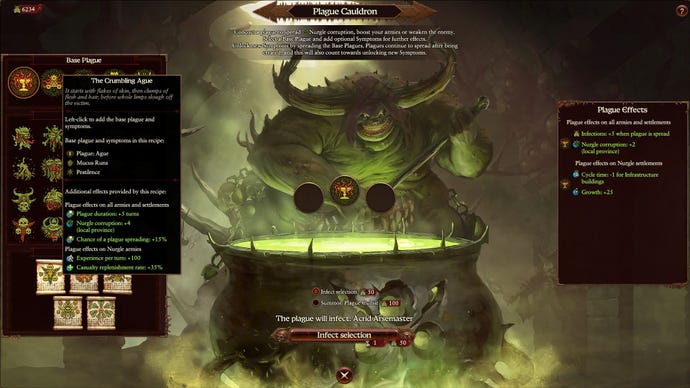
The Plague Cauldron
- The Plague Cauldron is the single most important mechanic for Nurgle, and learning how to get the most out of it is essential in securing a virulent, viral victory for the pustulent Pox Makers of Nurgle.
- You’ll start off with five base plagues, each of which can be augmented with two additional symptoms, which you’ll unlock either through technology or spreading that base plague a certain number of times. This number will be shown on the symptom.
- Eventually, you’ll unlock the plague recipes at the bottom. Each of these carries the symptoms of one base plague, two symptoms, as well as a slew of additional effects. More on these in a second.
- Once you’ve selected a plague, you have three options. You can target a settlement or an army you own, or summon a plague cultist to infect an enemy army or settlement.
- Plagues will spread to other armies and settlements of their own accord, but there are certain symptoms, technologies, and province commandments that increase this chance.
- Note that each plague has different effects on whether it’s been contracted by a friendly or enemy army or settlement. Plagues have positive effects on you, and negative effects on your enemies.
- Spreading plagues costs Nurgle’s unique resource, infections, which can be gained from cult buildings which will spring up in locations with high Nurgle corruption. You can also gain them from winning battles, sacking or razing enemy settlements, or spreading most plagues.
- Your first port of call should be unlocking “The Crumbling Ague”, which can be achieved very early by researching the relevant tech and spreading the basic Buboes plague the requisite number of times. Once unlocked, cast this on your own armies for a massive 35% replenishment boost and vanguard deployment for your entire army. This synergises beautifully with Nurgle’s special recruitment mechanics and slow speed, and should give your campaign a huge boost.
- Crumbling Ague aside, many of the other Plagues are quite situational. The ‘Fever’ system has the potential to net you a lot of free cash, and sacking a few cities with ‘Black Plague’ active should net you enough income to steamroll your foes.
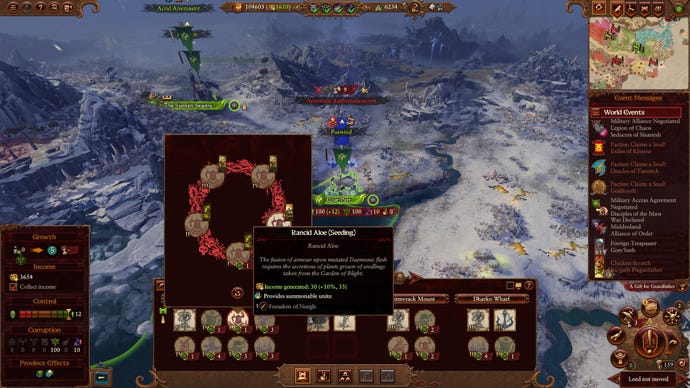
Nurgle Buildings and Recruitment
- Nurgle factions have a unique building system, not only different from the other chaos or mortal factions, but completely new to Total War. Make sure you spend some extra time with the building browser to familiarise yourself with it.
- Instead of upgrading each building chain, you only need to build the initial structure once, after which they will cycle automatically. Some building chains can have their cycle time reduced by technology, other buildings, or commandments.
- Recruitment buildings need to pass through a cycle for the unit displayed on that cycle to be added to your global recruitment pool.
- Certain buildings will only reach the highest level of their cycle if the main settlement building is at that level or higher.
- All Nurgle’s recruitment is global, and lords can instantly recruit any units from the global pool. The trade-off is that units spawn at 40% of their maximum health. This can greatly offset with replenishment bonuses, such as the one from Crumbling Ague.
- The more of a certain building you have, the more units will be added to your global recruitment pool when they hit that cycle.
- This makes Nurgle settlements very easy to defend, as long as you keep a decent stockpile of cash. As soon as a settlement is threatened, summon a lord, fill up an army, and cast Crumbling Ague. You’ll have a full, mostly healthy stack the very next turn, which can be disbanded once you’ve fended off the attackers.
That covers it for getting the most out of Nurgle! The Poxmakers are definitely one of the hardest factions to get to grips with, but once you’ve ironed out the kinks, you should find them extremely powerful, able to summon up devastating armies almost instantly. Looking for more tips? Check out our Total War: Warhammer 3 beginner’s guide to kickstart your campaign. Or, If you want to know more about the game, here’s our Total War: Warhammer 3 review.
